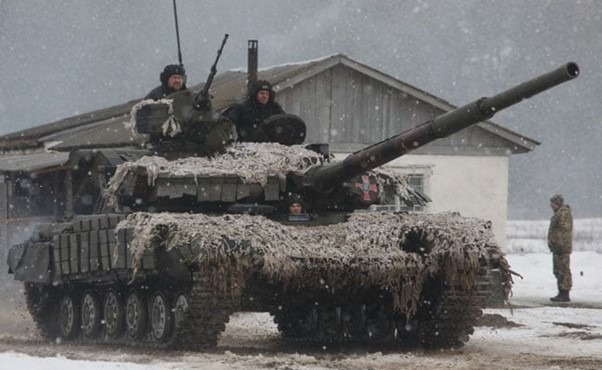| Translate This News In |
|---|
Russia appeared to open the door to a diplomatic solution to the widening Ukraine conflict on Monday, as the US stated that Vladimir Putin has yet to make a final decision on invading the former Soviet republic.
While Russia announced the cessation of some military drills, possibly signalling a de-escalation of the issue, the prospect of invasion remained high in Washington, with a top official calling the threat “more real than ever before.”
As speculation grew that Russian troops massed on the Ukraine border might launch an attack this week, German Chancellor Olaf Scholz was scheduled to meet with Russian President Vladimir Putin in Moscow on Tuesday, the latest in a series of European leaders’ visits aimed at preventing a full-blown conflict.
Previous guests have received a cold reception from Russian President Vladimir Putin and his top advisers, who have insisted that the current situation is the product of the US and Western Europe’s failure to address Moscow’s legitimate security concerns.
He told Putin that his discussions with leaders in European capitals and Washington revealed enough potential for progress on Russia’s goals to be worthwhile.
In televised remarks, Lavrov stated, “I would propose continuing.” Putin said, “Fine.”
At the United Nations, Secretary-General Antonio Guterres stated emphatically that “diplomacy is the only option,” and that abandoning it in favour of conflict would be “a leap off a cliff.”
While some saw the Russian words as a sign of de-escalation, the Pentagon claimed Moscow’s soldiers on the Ukrainian border were still rising, “far north of 100,000.”
Washington, said to Pentagon spokesman John Kirby, still does not believe Moscow has made up its mind about invading.
In light of the “dramatic escalation” of the buildup, the US said it was following other countries in transferring its Kyiv embassy to the western city of Lviv.
Scholz is flying to Moscow.
In a video message to the nation saying the day will be recognised as “Unity Day,” Ukrainian President Volodymyr Zelensky appeared to dismiss the proposal, despite Western intelligence sources warning that Wednesday might signal the start of an invasion.
“According to reports, the invasion will take place on February 16th. We’re going to turn it into a day of unity “‘Fly the national flag in defiance,’ Zelensky remarked, pushing his fellow countrymen.
Western officials regard Russia’s army buildup as the greatest threat to the continent’s security since the Cold War, and have prepared a punishing package of economic sanctions in the event of an attack on Ukraine, despite Moscow’s repeated denials.
Recent Russian military drills, including one with Belarus, where the US stated Moscow had sent 30,000 troops for more than a week of rehearsals, have generated fresh concerns, though Russian Defense Minister Sergei Shoigu informed Putin on Monday that part of the operations were “finishing.”
Scholz said there was “no reasonable basis” for the force build-up during a press conference in Kyiv alongside Zelensky, assuring that Berlin and its partners will continue to defend Ukraine’s security and independence.
In a joint press conference with Scholz, Zelensky reiterated that joining NATO would ensure Ukraine’s survival, a crucial sticking point in Russian-Western talks.
Scholz, though, as he prepared to travel to Moscow, urged Russia to accept “conversation offers.”
Germany already plays a key role in efforts to mediate in eastern Ukraine, where a brutal struggle with Russian-backed rebels has cost the lives of over 14,000 people.
However, Kyiv’s pro-Western politicians and US President Joe Biden’s administration remain concerned about Germany’s close business relations with Moscow and heavy reliance on Russian natural gas imports.
‘Digging trenches’ is a term that is used to describe the process of digging trenches.
While diplomats awaited results, poor children in the care of Christian groups assisted with war preparations on the front line separating Kyiv-held territory from territories controlled by Moscow-backed separatists in the east.
“We’re creating trenches that Ukrainian soldiers will be able to climb into and protect if the Russians strike,” Mykhailo Anopa, 15, told AFP.
Russians in Moscow were not interested in fighting.
“People in the West do not comprehend that Russians and Ukrainians are one people,” Pavel Kuleshov, a 65-year-old pensioner, told AFP. “No one wants a civil war,” says one of the participants.


















